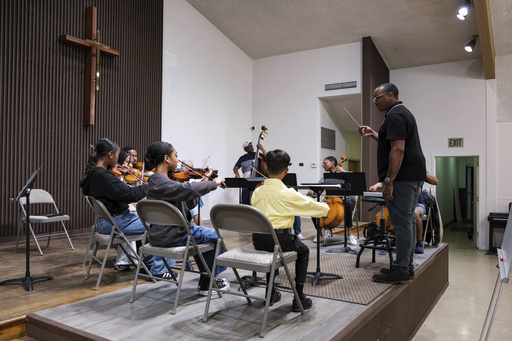
ANAHEIM, California — For over two years, Ebonie Vazquez has been on a quest to find a mentor of color for her son, Giovanni, who is 11 and passionate about the violin. Her search led her to a local church that has become a supportive community for budding musicians.
New Hope Presbyterian Church, a diverse congregation under the guidance of a Black female pastor, recently initiated a string orchestra program in April. This initiative was designed to be inclusive, attracting students who might struggle with accessing or affording traditional music programs, especially in the affluent landscape of Orange County.
The Rev. Chineta Goodjoin expressed that her church had maintained a smaller strings program for years. The inspiration to expand came when her daughter Nyla joined the Inner City Youth Orchestra of Los Angeles, founded by reputable conductor Charles Dickerson in 2009. Goodjoin was motivated to emulate this model in Orange County, enlisting Dickerson to lead the effort.
Currently, the orchestra boasts around 18 members, aged 9 to 20, who play violin, viola, bass, and cello. What sets this orchestra apart is its open-door policy – students can join without auditions, and there are no fees. Similar to the Los Angeles-based group, this orchestra is supported by mentors who share similar backgrounds with the young musicians they coach.
Ebonie Vazquez noted the empowerment that students experience when they see representations of themselves in their mentors and educators. She emphasized the importance of fostering an environment where they feel included and supported. “It has definitely helped my son connect more to the music and the craft,” she explained.
During rehearsals, Giovanni’s enthusiasm for music is palpable. His eyes sparkled with excitement as he shared his thoughts. “I just want to be able to express myself in my music and show that I not only have talent, but I also take my time, and I practice,” Giovanni said. He articulated how subtle changes in music can transform a piece, reflecting both his youthful excitement and a mature understanding of artistry.
In the church orchestra, he enjoys the flexibility to play classical pieces alongside contemporary music like that of Imagine Dragons. Giovanni also participates in his school orchestra and Dickerson’s Los Angeles group. Being part of the church orchestra holds significant value for him, describing it as an integral piece of their community.
“They encourage young musicians of color and everyone gets a chance to play and maybe use it as a stepping stone to get better or even turn this into a career,” he stated. He dreamily expressed aspirations of performing at Carnegie Hall but quickly added that his true joy lies in sharing music with those who appreciate it. “My favorite part is really to see people enjoy music,” he shared.
Melissa Bausley, a cellist who works in finance, also contributes as a mentor. She spoke about her experiences as a Black woman in the music field, remarking on the absence of African American educators during her upbringing. “I never had a teacher that was African American growing up and I didn’t think it mattered or made a difference,” she acknowledged. However, her perspective shifted as she recognized the value of representation in learning.
Dickerson, who launched the Los Angeles orchestra, noted that his project emerged in response to students’ desires for accessible musical opportunities within their community. Many students previously felt out of place in distant orchestras where they didn’t know anyone. “Young kids from our communities were always put in the back row and the back row was right next to the door,” he said, emphasizing how this could lead to feelings of exclusion.
Goodjoin and her husband, who is also involved in music, aspire to create an environment where African American youth can excel in classical music. “We want them exposed to all genres,” she emphasized, indicating that they learn about a variety of composers, including Count Basie and Duke Ellington. She believes that integrating this education, including Black composers, enriches the children’s experience and opportunities.
According to Goodjoin, the church provides a necessary platform for conversations surrounding equity in music. “We value social justice and equity and we believe we are called to help the marginalized,” she explained, associating music with freedom and expression. The uplifting feedback from parents has been encouraging; one mother commented that her son felt relieved from competition pressures as he embraced playing in the church orchestra.
Carol Nealy, another parent, expressed her appreciation for the church’s role in cultivating a supportive environment not only for spirit and nourishment but also for music. “It’ll have an impact for generations because their children will see their parents pick up and play the violin,” she remarked.
Elizabeth Moulthrop, who heads El Sistema, highlighted the rich history of music and art within church settings as natural platforms for self-expression. Programs like these often provide access to valuable resources such as summer camps and scholarships for aspiring musicians.
Dickerson emphasized that the orchestras serve to enhance community value, aiming to uplift young individuals and provide them with better opportunities. He highlighted the social perceptions that often deter young people from embracing instruments like the violin. “It’s not cool to carry a violin down the street,” he noted. However, with the support of peers in the orchestra, a sense of pride develops as opposed to feelings of inadequacy.
The Black Church has historically functioned as a gathering space for community solidarity. Dickerson mirrored this sentiment, tracing back its legacy of creating opportunities when mainstream avenues were unavailable. “If we can come together in the church and create a symphonic orchestra, all I can say is all praise to God,” he concluded.
